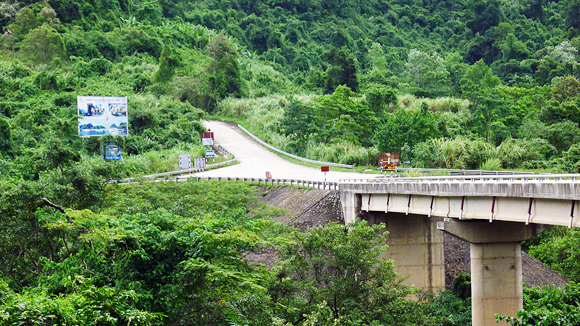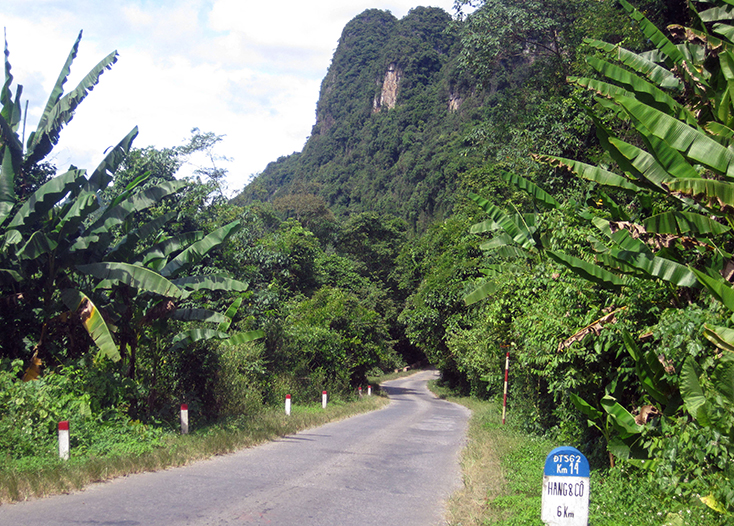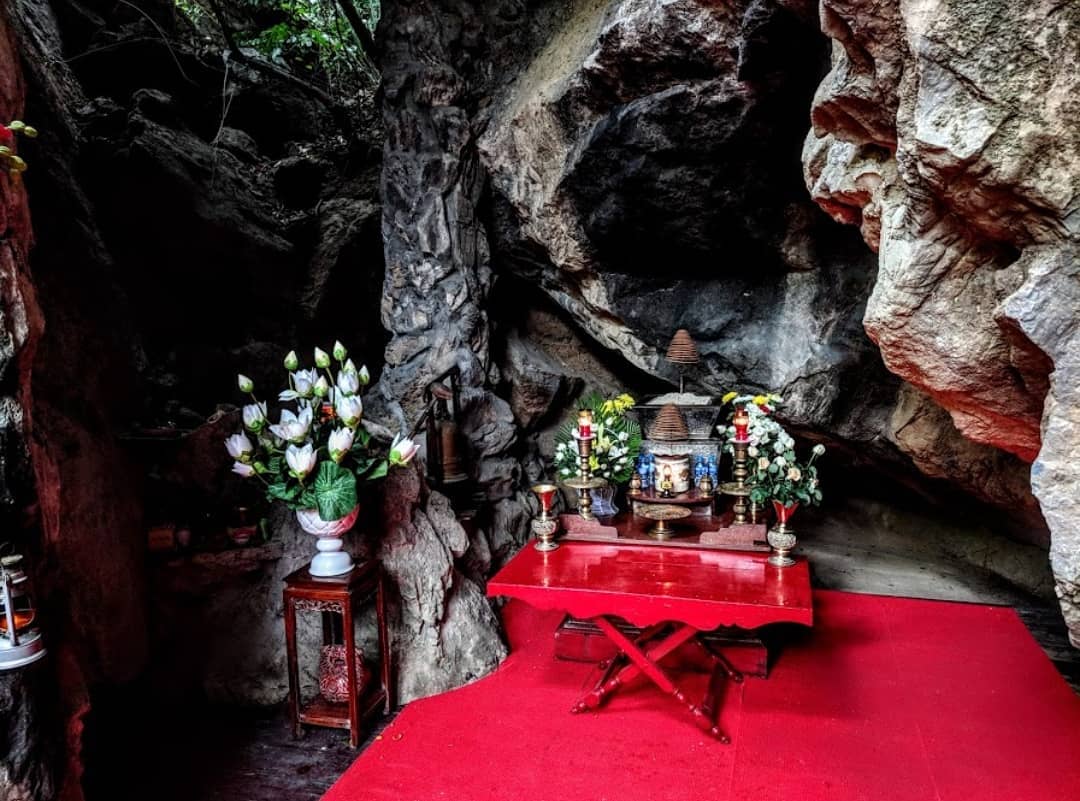
The determination to implement the strategies instructed by the Party and by Uncle Ho was to open the road, provide manpower aid, and resources sent to the front line from the rear, aiming at liberating the Southern Area, uniting the country, the assaulting youth ( Young Volunteer Force), firing – line conscripted labor, citizens and military forces implemented the construction of the road at lightning speed, cutting through forests, chopping mountains and breaking snow to make the victory. Road 20 – Quyet Thang goes through old forest of Truong Son group with various high passes, deep streams, abysses, mountainslopes, and risky cliffs. This location was hardly occupied with human prints. This area was full of bird’s twittering, beasts snorting year to year; covered with fog days and nights; characterized by heavy rains, unexpected floods, little sunlight… Therefore, it could be said that area was occupied with loads of difficulties, obstacles, and hardship, however, they could not shake the determination and the will to open the road to carry aid and assistance to the Souther Frontline during the war. With great courage and iron will, extraordinary energy, from December 20, 1965 to May 5 , 1966, our forces, especially the Young Volunteer Force, managed to break through Truong Son and opened 123km from Phong Nha road to Lum Bum Turning – Point belonging to Laos to carry out the task of making aid and assistance to the Frontline. During 7 years ( from 1965 to 1972) , no one could estimate or calculate the loss, the sacrifice of Truong Son soldiers caused by American Gun – Fire. Despite of all the loss, danger, our soldiers never lost their determination in holding on to the position to ensure open traffic on the road. Road 20 witnessed the most violent competition and fight between the total air force of America and our traffic and transportation force. This area was hardly quite or without the terrible noise and explosions from bombs or the roars from American planes on the sky above Road 20. Any workers, Young Volunteer Force , and soldiers who used to stay here could not avoid the fierce grappling, hatred, and deadly danger of this location.
The young fellows, girls, mostly at the age of nineteen or twenty, kept sticking to the strategic spots under regular attack and raid by the enemy such as ATP (the turning point with the form of the letter A, Tale latent, Phu La Nhic Pass), Tra Ang main Point, Ca Roong, KM 16.5, Ba Thang Slope….other spots like forest door, traffic spots, car parking site, storage, emergency station… and another main point. American Press used to call these main points as ” fire coordinates” , by which anyone passed would become “special steel” that never melted. However, the strength of the enemy failed to shake of suppress the will as well as the determination of Truong Son's military force. It should mention the image of tank drivers who tried to open their eyes in the light from small lamp, struggling with bad roads with holes, clearances and damage caused by bombs, fires, and heavy rains. It should mention the time bomb and magnetic bomb destroyers who had to work days and nights to open the road for smooth transportation. They understood that they might be dead at any time but never hesitated or kept second mind. It should mention the TNXP force with the spirit: ” putting on the shoe at bomb explosion, shovel in hand, ready for the battlefield” to save people, save vehicles, save commodities. Nothing could be more beautiful as the sense of the young men, and young women with white clothes, lamp in land as “live pilot pillars” at streams, risky and dangerous turning points so that “road aviators” could drive the vehicle safely onwards. They were the soldiers who burnt themselves to attract the enemy’s planes to save their comrades in danger. They were nurses who brought injured soldiers back to the battlefield sacrificed on the hammock mounted by the road. A country only knew them by the notice of death saying that they” Sacrifice on duty”. Therefore, their death was immoral and they were good examples for those who sacrificed their life for the nation.
The Slogans “Live to hold on the road, dia steadily and courageously”, “The enemy destroys the road, we repair to go”, All for our blood Southern Area, all for victory” were the mental incentives and stimulations to make unlimited strength and energy for Truong Son Soldiers and the Road to crate wonderful feats of arms.

A- letter turning point located in the heart of ATP main point was one of the most violent point among 42 main point along the length of 16,000 km in Truong Son. This location was characterized by difficult and risky territory: high mountain on one side, deep abyss on another side with many zigzag turning points. This is one of the extremely important positions that was scrambled each meter of road by the enemy to prevent our aid, however, we tried every effort to protect it to ensure open traffic. As a result, the American Capitalists used the most advanced and modern weapons in this location. This focused area had to suffer from 3,020 times of bombings released and destroyed by the aircraft (including 270 of Bomb B52) including 20,600 high explosive bombs, 790 injuring bombs and 3,400 fragmentation bombs, 160 rocket bombs, 216 fire bombs…there were some days in which they dropped bombs nine times including 8 times of B52. ATP focusedsystem was always like “fire pan”in which life and death was only at very short distance. There was a moment when Road 20 was all the time in blocked situation: therefore. no vehicle could pass Phu la nhic Pass. But brave spirit ensured safe passing, there were nearly 200 soldiers sacrificed permanently in this area whose blood and bone penetrated in each centimeter land and road.Tra Ang Main Point was at the height of 150 compared with the road surface, with the length of 5 km, narrow roadway. In addition, it was characterized by risky cliff on one side and deep abyss on the other. The enemy found that this was our transportation “pharynx” so they did constant attacks. They used to raid in 87 consecutive days and nights with 793 attacks in oder to cut out our support. There was some days they used a total of 27 B52 and 30 other aircraft to drop coordinate bombs, causing injury and death for hundreds of peoples. In Tra Ang stream, it took 6 days (from September 5, 1968 to October 1, 1968) to transport 60 petrol tanks to the assembling location that was 5km away. This was resulted from violent fires and bombs attacked by Americans. Also in this location, army station 14 organized 4 teams to transport petrol upstream, crept through the main point where they discovered and bombs by the American army, resulting in the fact that our soldiers were painly burnt on their back. When they reached the assembling location, they only managed to protect 30 petrol tanks. However, this task cost the death of 29 soldiers with blood and petrol overloading the Tra Ang stream. Tra Ang Stream became the “petrol and blood legend ” of Truong Son soldiers.
Km 16.5 Main Point on Road 20 also became a legend. On November 14, 1972 – a historical day, violent boom attacks were frenziedly dropped down to the land. These attacks could be felt by people. Even when they had not heard the noise from aircraft, they could still feel that the bombs were dropped somewhere. On these days, B52 rained bombs with large quantity of about 180 bombs at on time. The space was shaken, the cliff rocked. Sadly, 5 artillery men were dead in this attack. Moreover, on the other side of the road, a huge stone of 100 tons collapsed to cover 8 assaulted youths in C217 unit (including 4 men and 4 women) in the cave they were hiding. They cried for help but no one could do anything to shake the huge stone out of the cave door. It was destiny. On the back, more than 150 special trucks were on the need to withdraw from the battlefield. To deal with that situation, a soldier was willing to stay o the site to find the solution, whereas the others rushed to lever the road to ensure the open road for the truck team.

The following days, they tried every effort to supply necessary things and aid to their comrades but they could do no more. Days went by slowly and sadly because they understood that their comrades were dying from starvation, minute by minute, second by second. Seven days after that, the whole unit knew that there was no hope for saving their comrades; therefore, they carried out commemoration for their poor comrades who permanently left this life at young age. Km 16.5 became the legend of the national history. To memorize the brave sacrifice of 8 assault youths, people called the cave in which they were dead as ” Tam Co Cave” (Eight Lady Cave) . Now, they build the memorization temple for the martyrs sacrificing on Road 20 Quyet Thang whose services are immoral with the time.

The war finished a long time ago, however, the memory about Truong Son Road, Ho Chi Minh Road never fades away in the Vietnamese mind. Truong Son Relics in the heart of Phong Nha – Ke Bang Heritage are legends and immoral stories like an undaunted and magnificent statue with the time and national history. Visiting Phong Nha – Ke Bang Heritage, we do not mean to enjoy only the natural beauty and landscape but the old battlefields with many precious memories about the past, and it is also an opportunity for us to memorize and be grateful for the brave sacrifice of various generations for a sacred expectation: United Country
